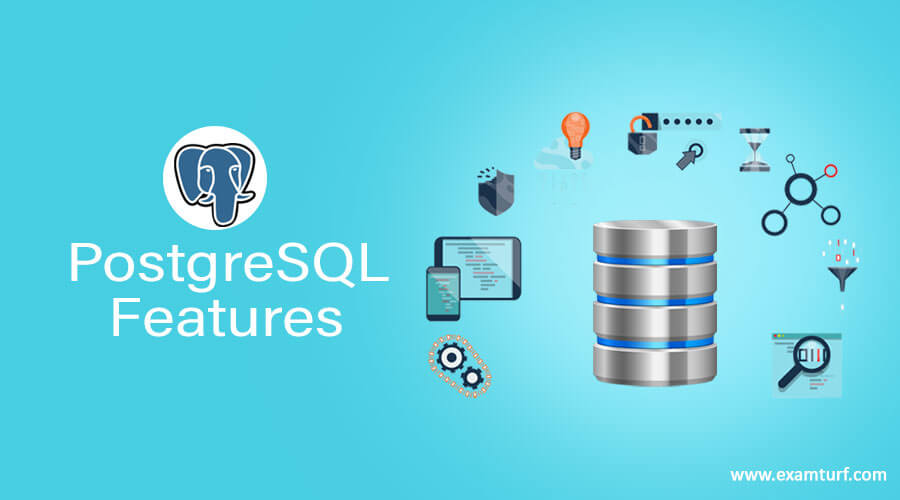
Introduction To PostgreSQL Features
The following article provides an outline for PostgreSQL Features. As we can derive from the name PostgreSQL, a platform related to SQL or a system that revolves around SQL operations or database operations. PostgreSQL thus is a relational database management system that has been developed solely to handle a large amount of data for various kinds of software and applications which are being used to perform different types of tasks for several organizations and companies which may include government entities also.
It is being used by a lot of different companies due to its uncomplicated nature and it being freely available in the open market. Most importantly, its flexibility for supporting a lot of different programming languages like Java, C#, C, C , JavaScript, etc, as all of these types of programming languages are only being used to create almost all of the applications and software currently available in the market or being used by many companies and institutions. So basically the entire operation is interrelated to each other, PostgreSQL supports all the languages which create theses app and while using these apps the companies also automatically uses PostgreSQL to support their backend processes.
Features of PostgreSQL
Given below are the features of PostgreSQL:
1. The most important feature of PostgreSQL is it is open-sourced and thus freely available to be downloaded from the official website of PostgreSQL.
2. Postgres flexibility makes it highly compatible thus it can be used on several operating systems like Windows, MAC OS, UNIX, and Solaris.
3. Its compatibility also provides data integrity for the primary keys, foreign keys, unique keys, and locks.
4. Its flexibility also provides many important features like Multi-Version Concurrency Control which give access to multiple or parallel access to several databases at the same time.
5. It can handle complex queries and sub-queries.
6. It supports table partitioning.
7. It supports multiple data types like Structured, Primitive, Geometric, and Document types.
| Parameters | Data Types |
| Structured | Array, Date and Time, Range |
| Primitive | Integer, Numeric, String, Boolean |
| Geometric | Polygon, Point, Line, Circle |
| Document | XML, JSON/JSONB, Key-value |
8. It also assists in procedural Languages such as Perl, PLSQL, and Python, etc.
9. It has a robust access control system, where it has created different types and levels of encryptions and security protocols to grant access to databases.
10. Its high reliability makes it support different types of Replications like Synchronous, Asynchronous, and Logical replications.
11. It supports table inheritance, where a child table can inherit certain characteristics from its parent table.
12. It also supports nested transactions.
So these are some of the various types of features, stressing on ‘some’ as there are several more from where these came from PostgreSQL possesses.
Advantages Of PostgreSQL
Due to its extensive and flexible nature, PostgreSQL has been deemed one of the most or probably the most professional database systems in the current market. It has been awarded as the “Database System of the Year” several times. Its stability, reliability, and security make it a major performer in the technological arena and mainly in the database system world.
Some of the important advantages of PostgreSQL are as follows:
- It is very easy to use and is quickly learnable.
- Data management also can be handled very smoothly and effortlessly.
- As it is an open-source product, costs for its usage and maintenance is free.
- Its several different parameters make it enable to handle and execute complex and dynamic web applications and software.
- Its scalable nature makes it highly extensible as it can handle bigger and larger backend processes easily.
- It possess enhanced and reliable security measures which also increases its durability.
Uses Of PostgreSQL
PostgreSQL is used by many organizations and companies from big to small to even singular entrepreneurs for various purposes and requirements. It’s all because of its nature.
Some basic uses of PostgreSQL are:
- It is used in cloud computing platforms for backend server processes to store and dump large quantities of data.
- It is also used by Government Institutions to perform several crucial and complex tasks like analysis and intelligence works.
- It is also used for business intelligence purposes to handle business analytics and risks.
- It can handle also large and secure online financial transactions by many financial and manufacturing industries.
- PostgreSQL has PostGIS extensions that handle geospatial databases for geographic information systems.
Conclusion
After a thorough discussion in all these above-mentioned points, we can ascertain the importance and significance of PostgreSQL. There is a reason why it has been awarded “The Database System of the Year” so many times. It can challenge the big DBMS players like Oracle and IBM thus making it probably the best and highly profitable software platform carefully developed through the years for the sole intention of providing the best of services for the modern & tech-savvy netizens of this world.
Recommended Articles
This is a guide to PostgreSQL Features. Here we discuss the introduction to PostgreSQL, its features, and its uses along with its different advantages. You can also go through our other suggested articles to learn more –
Are you preparing for the entrance exam ?
Join our Data Science test series to get more practice in your preparation
View More